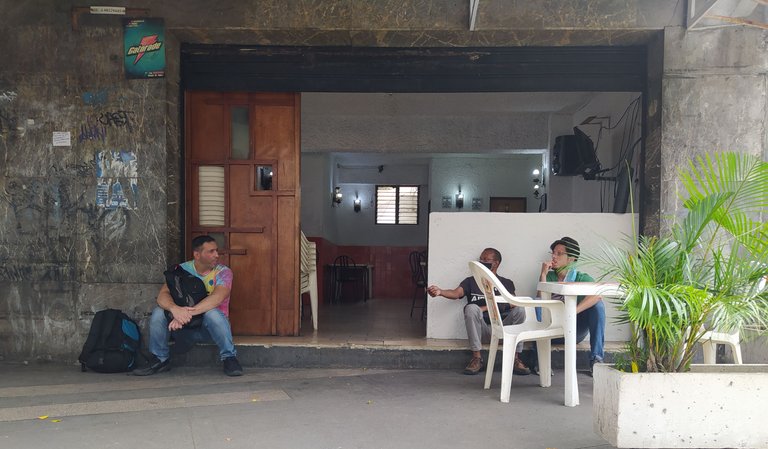¿PRIMERO LA HARINA O EL AGUA? // FLOUR OR WATER FIRST? [[ESP/ENG]]

El mundo que nos rodea nos asfixia, nos suprime, y en algunos casos nos agota, a tal punto de cansarnos de nosotros mismos en algún momento. Pero no conversaremos sobre este punto de aprendizaje, sino de como nosotros buscamos asfixiar, suprimir y agotar a los demás cuando nos sentimos lo suficientemente cómodos con nuestros "conocimientos" y nuestra "personalidad", y buscamos en las demás personas una extensión de nosotros mismos para reforzar nuestra convicción de que estamos viviendo la vida de forma correcta.
Por redes sociales como Facebook e Instagram, hace algún tiempo se gestaba una disputa entre los internautas del país Nor-sudamericano, Venezuela, sobre si la preparación de las arepas –un alimento tradicional de su gastronomía popular– llevaba primero el agua o la harina. Obviamente se encontraba el bando de los "Harina" y el bando de los "Agua" que entraban en disputa por ver quién era el que tenía la razón, y sentirse con aires de superioridad cuando les eran expuestas las razones contrarias porque su verdad imperaba sobre las otras. Obviamente hay una ciencia ligada a la cocina que lleva sus procesos y procedimientos estrictos y necesarios, como por ejemplo la preparación de una masa para hacer pan no lleva la misma cantidad de ingredientes para ciertos panes en específico, sin embargo lo que se discutía se hacía sin ninguna razón culinaria, sino más bien por el simple hecho de superioridad sobre otros por ser ignorantes de si primero va el agua o la harina.
Luego la disputa se extendió a través de las redes digitales al territorio vecino y fronterizo de esta nación Bolivariana, Colombia. Pero esta vez la contienda se daba sobre quien tenía la exclusividad de haber "inventado" la arepa, es decir, los colombianos dicen que la arepa es originaria de su país, y los venezolanos del suyo. Como es obvio no se evaluaban aspectos históricos ni gastronómicos para el debate sino que simplemente eran unos contra otros demostrando con argumentos ineptos sus razones vacías de racionalidad. La hamburguesa, por ejemplo, es originaria de Hamburgo en Alemania porque como allí se originó, se le denominó en su etimología la propiedad de ser procedente de Hamburgo, y luego se extendería en los Estados Unidos gracias a los inmigrantes alemanes; aunque tiene sus precedentes en pueblos mongoles de la época del imperio romano, es decir, que no es cien por ciento seguro que sea originaria de Alemania o Estados Unidos.
Posterior a esto, los venezolanos que se gastaban por las redes sociales con estos temas tomaron un aire de superioridad sobre cualquier otro país del continente, y comenzaron una campaña casi que política sobre que "Venezuela es el mejor país del mundo", todo esto a consecuencia también del racismo y la xenofobia que sufrieron los migrantes venezolanos en otros países de Latinoamérica. Comenzó entonces una disputa virtual sobre un ranking invisible de cuáles eran los mejores países del mundo, todo esto al mismo tiempo que la corrupción, la inmoralidad y la ignorancia hacían desastres en estos supuestos "mejores países del mundo". Las personas discutían, y aún discuten sobre esto en redes, también sobre el aborto, el matrimonio gay, las selecciones de fútbol, y muchas otras cosas, pero ¿Cuál es el sentido de todo esto?
Pues como mencioné anteriormente, todos, absolutamente todos nos sentimos superiores cuando discutimos y creemos tener la razón no sólo en las redes sociales, sino también en público. Nos satisface dejar sin argumentos a quien piensa distinto a nosotros independientemente de si nuestras razones son válidas argumentativamente hablando. Ni hablar de la pedagogía, porque menos nos interesa dejar una enseñanza o una reflexión pedagógica al otro, sino más bien mientras más ignorante quede, más grandes e inalcanzables nos sentimos.
La diferencia está en controlar ese sentimiento, como una vez me habló un profesor que estimo mucho, César Torres, sobre Jurgen Habermas en una clase de Teoría de la Opinión Pública dónde explicaba que las personas cuando ejercen su pensamiento son en un 90% emoción y un 10% razón, y que sólo el 5% de las personas que conforman la opinión pública opinan desde la razón, y no desde la emoción como la inmensa mayoría. He ahí el problema de las personas, que se dejan llevar por las emociones durante las discusiones y dicen cualquier cantidad de barbaridades, cuando en realidad debemos controlar esos sentimientos que nos hacen ser brutos, y detener ese frenesí para utilizar el pensamiento racional y poder analizar que lo importante no es cuál sea el mejor país del mundo, ni quién haya inventado la arepa, o si primero se le echa agua o harina, sino pensar que hay millones de cosas mucho mas importantes que esas, y que no son motivo de discusión en ningún sitio virtual, o son completamente ignorados por los internautas que todavía siguen debatiendo si es primero el agua o la harina mientras los niños siguen muriendo de hambre y de sed en el mundo.
The world around us suffocates us, suppresses us, and in some cases exhausts us, to the point of tiring of ourselves at some point. But we will not talk about this learning point, but about how we seek to suffocate, suppress and exhaust others when we feel comfortable enough with our "knowledge" and our "personality", and we look to other people as an extension of ourselves to reinforce our conviction that we are living life the right way.
Through social networks like Facebook and Instagram, some time ago a dispute was brewing among Internet users in the North South American country of Venezuela over whether the preparation of arepas - a traditional food of its popular gastronomy - used water or flour first. Obviously there were the "Flour" side and the "Water" side who were in dispute to see who was right, and felt superior when the contrary reasons were exposed to them because their truth prevailed over the others. Obviously there is a science linked to the kitchen that has its strict and necessary processes and procedures, for example the preparation of a dough to make bread does not have the same amount of ingredients for certain specific breads, however what was discussed was done without any culinary reason, but rather for the simple fact of superiority over others for being ignorant of whether the water or the flour comes first.
Then the dispute spread through digital networks to the neighboring and bordering territory of this Bolivarian nation, Colombia. But this time the dispute was about who had the exclusivity of having "invented" the arepa, that is, Colombians say that the arepa is originally from their country, and Venezuelans from theirs. As is obvious, neither historical nor gastronomic aspects were evaluated for the debate, but simply one against the other, demonstrating with inept arguments their empty reasons of rationality. The hamburger, for example, is originally from Hamburg in Germany because as it originated there, it was named in its etymology the property of being from Hamburg, and then it would spread in the United States thanks to German immigrants; although it has its precedents in Mongolian peoples from the time of the Roman Empire, that is to say, it is not one hundred percent sure that it is originally from Germany or the United States.
After this, the Venezuelans who were spending their time on social networks with these topics took on an air of superiority over any other country in the continent, and began an almost political campaign about "Venezuela being the best country in the world", all of this also as a consequence of the racism and xenophobia suffered by Venezuelan migrants in other Latin American countries. A virtual dispute began about an invisible ranking of which were the best countries in the world, all this at the same time that corruption, immorality and ignorance were making disasters in these supposed "best countries in the world". People argued, and still argue about this in networks, also about abortion, gay marriage, soccer teams, and many other things, but what is the point of all this?
Well, as I mentioned before, we all, absolutely all of us feel superior when we argue and believe we are right not only in social networks, but also in public. We are satisfied to leave without arguments those who think differently from us regardless of whether our reasons are valid argumentatively speaking. Not to mention pedagogy, because we are less interested in leaving a teaching or a pedagogical reflection to the other, but rather the more ignorant he/she is, the bigger and more unreachable we feel.
The difference lies in controlling that feeling, as a professor I hold in high esteem, César Torres, once told me about Jurgen Habermas in a class on the Theory of Public Opinion, where he explained that when people exercise their thinking they are 90% emotion and 10% reason, and that only 5% of the people who make up public opinion give their opinion from reason, and not from emotion as the vast majority do. That is the problem of people, who get carried away by emotions during discussions and say any number of barbarities, when in fact we should control those feelings that make us be brutes, and stop that frenzy to use rational thinking and be able to analyze that what is important is not which is the best country in the world, or who invented the arepa, or whether to add water or flour first, but to think that there are millions of things much more important than those, and that are not the subject of discussion in any virtual site, or are completely ignored by Internet users who still continue to debate whether water or flour comes first while children continue to die of hunger and thirst in the world.

Esta reflexión me hizo recordar que un programa de radio decían que la palabra convencer, si la separamos sería algo como con vencer o tratar de vencer al otro, sin importar que tengas o no la verdad, lo más importante es imponer la razón.
Es así, siempre buscamos vencer. Gracias por tu comentario y por haber leído mi publicación.
Congratulations @ocatia! You have completed the following achievement on the Hive blockchain and have been rewarded with new badge(s) :
Your next target is to reach 30 posts.
You can view your badges on your board and compare yourself to others in the Ranking
If you no longer want to receive notifications, reply to this comment with the word
STOPTo support your work, I also upvoted your post!